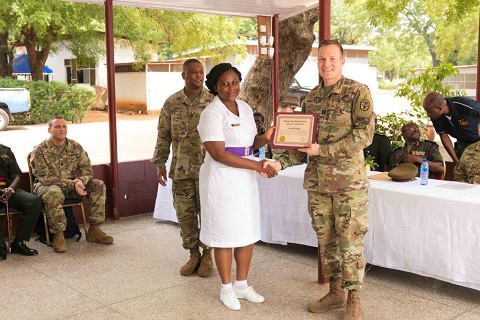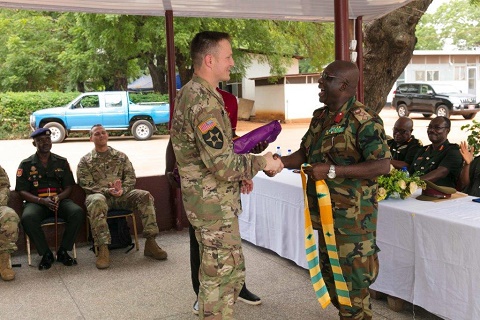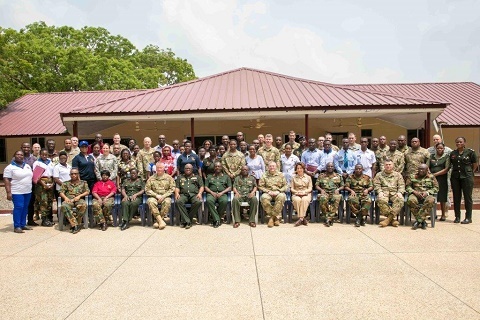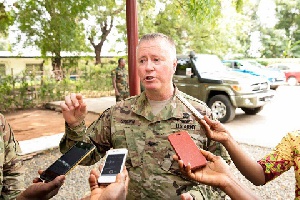Medical personnel from the United States, have expressed the need for building partnerships and relationships among medical personnel from different environments, that make it easier for them to exchange expertise and ideas.
Colonel John Osborn, Command Surgeon of the US Army Africa, made this known at the closing ceremony of the US Army Africa’s Medical Readiness Training Exercise (MEDRETE) in Accra on Friday.
He said in the changing medical world, it was important to build relationships that allowed personnel to be able to call on each other for advice and assistance in their work.
“The medical in the world is changing. There are not enough doctors and we need to rely on partnerships and relationships that we create; where we exchange and help each other all over the world because medical is medical,” he said.
The three-week MEDRETE programme, the third in the series, took place at the 37th Military Hospital from February 5 to February 24, and saw 15 American Soldiers, including 12 active duty soldiers from Brooke Army Medical Centre in San Antonio, Texas and three from North Dakota Army National Guard soldiers, join their counterparts in Ghana to deliver medical services.

Col Osborn said the training equipped the American personnel with the skills to work in alternatively resourced environments, as doctors in the US sometimes relied too much on machines, such as CAT Scans, in their work.
“Now, they’re reliant on machines too much, in my opinion, because in Afghanistan and Iraq or other combat zones, we can’t carry a CT Scan on our backs so they learn to do a retinal scan (looking at the patient), and talk to the patient to diagnose,” he said.
He said his team learned a lot from their local partners on doing that.

In the spirit of reciprocity and partnership, Col Osborn hinted at the possibility, subject to permissions, of taking some medical personnel from Ghana, to also train with their counterparts in other African countries, in both medical and leadership modules run by the US Army Africa.
“We are building a regional support network,” that that can enable medical personnel to come together in a regional response to any disaster, such as Ebola.
Brigadier General Jeffrey Johnson, Commanding General of the Brooke Army Medical Centre said working together over the last three weeks had strengthened the partnership between Ghana and the US and enabled sharing of best practices for assessment and treatment.

Quoting Ghana’s first President Osagyefo Dr Kwame Nkrumah who said: “The forces that unite us are intrinsic and greater than the superimposed influences that keep us apart,” he thanked his Ghanaian counterparts and expressed commitment to strengthening the relationship with Ghana and other African partners.
Brig Gen Ralph Kojo Ametepi, Director of Medical Services at the Ghana Armed Forces, said the US team, aside from offering free medical services with their Ghanaian counterparts, with more than 330 patients treated and conducted 86 surgeries, had also donated logistics worth $15,000 to the Hospital.
He said the donation would help to address some of the logistical challenges that the Hospital faced and thanked them for the gesture. The Hospital presented gifts to their visitors, while the American team also presented certificates and gifts to some staff and officials of the Hospital.
Lieutenant Colonel David I. Tucker, an Oral and Maxillofacial Surgeon in the US Army, said he was impressed at how efficient Ghanaian doctors could be with the limited resources available, being able to treat a lot more patients in a day than in the US.
“We were able to treat some very advanced cases, involving tumours of the face and jaw as well as reconstruction, with the Ghanaian team,” he said.
“Sometimes in the US, you can get caught in ordering this test, that test, versus honing in on that physical examination skills,” noted Captain Annie Gerhardt, Nurse Practitioner with North Dakota National Guard.
She said the experience gained would be important in her work in a rural area in the US, as well as in her teaching of Nurse Practitioner students, on the importance of using those clinical skills versus spending lot of dollars, sometimes unnecessary, on some tests, thus reducing costs.
Capt Gerhardt said the training would also help her to think better and smarter, and to be more innovative with what was available in military situations.
Health News of Saturday, 25 February 2017
Source: GNA













